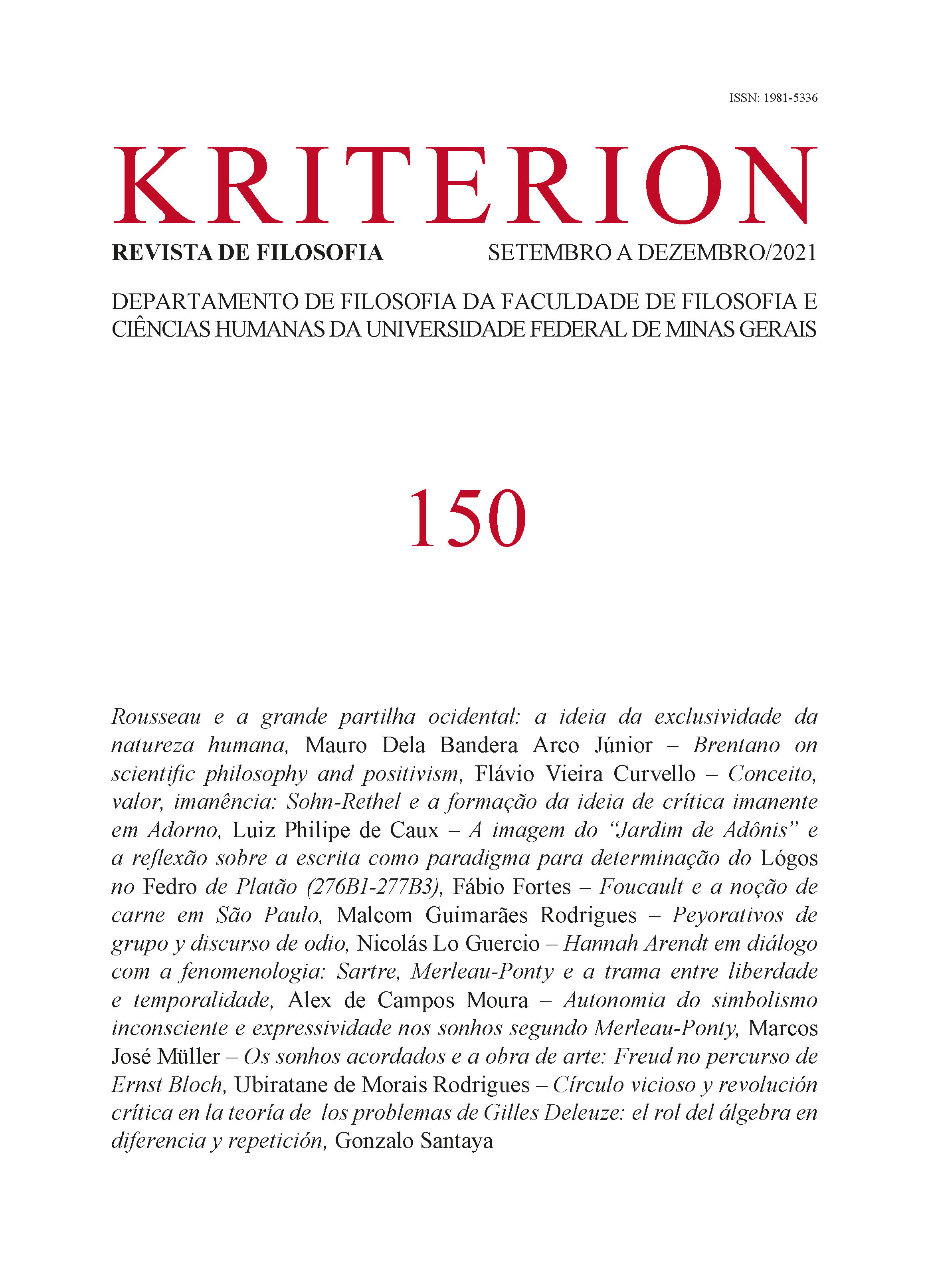THE IMAGE OF THE “GARDENS OF ADONIS” AND THE REFLECTION ON WRITING AS A PARADIGM FOR DETERMINING THE LÓGOS IN PLATO’S PHAEDRUS (276B1-277B3)
Keywords:
Plato, writing, orality, dialetics, lógosAbstract
The passage between 276b1 and 277b3 of the dialogue Phaedrus has been used to indicate a dichotomy between orality and writing, as a sign of an irreconcilable relationship between dialectics and writing. Both of them are associated respectively to a serious activity (spoudé) and a game (paidiá). In our reading, we intend to show that it is not possible to subscribe to such association, considering, on the one hand, that the passage must be read as a kind of synthesis of a more comprehensive reflection (the determination of the philosophical lógos, i.e., dialectics) and, on the other hand, that it is possible to see in this context layers of meaning produced by an intertextual dialogue (the debate on writing between Alcidamas and Isocrate). In this sense, we propose an interpretation which takes into account an immanent analysis of the passage, showing that it does not display signifiers for subscribing the dichotomy between orality and writing, followed by a discussion that puts it back in the overall context of the dialogue, by analysing the philosophical meaning of the image of the “Garden of Adonis” and the opposition between paidiá and spoudé.
Downloads
References
ALCIDAMANTE. “Testimonios y Fragmentos”. Tradução para o espanhol de J. L. López Cruces, Javier Campos Daroca e M. A. Márquez Guerrero. Madrid: Ed. Gredos, 2005.
BRISSON, L. “Introduction”. In: PLATÃO, 2004, p. 13-68.
BURGER, R. “Plato’s Phaedrus. A defense of a philosophic art of writing”. Alabama: The University of Alabama Press, 1980.
COTTON, A. K. “Platonic dialogue and the education of the reader”. Oxford: Oxford University Press, 2014.
FERRARI, G. R. F. “Listening to cicadas. A study of Plato’s Phaedrus”. Cambridge: Cambridge University Press, 1990.
FORTES, F. S. “A dialética e as letras: imagens e paradigmas do pensar no Fedro de Platão”. Tese de Doutorado em Filosofia. Belo Horizonte: UFMG, 2019.
HADOT, P. “O que é a filosofia antiga?” Tradução para o português de Dion Davi Macedo. São Paulo: Loyola, 2014.
HÖSLE, V. “Interpretar Platão”. Tradução para o português de Antônio Celiomar Pinto de Lima. São Paulo: Loyola, 2008.
HOWATSON, M. C. “The Oxford companion to Classical Literature”. Oxford: OUP, 2005.
ISÓCRATES. “Discursos I”. Tradução para o espanhol de Juan Manuel Guzmán Hermida. Madrid: Gredos, 1979.
NICHOLS Jr., J. H. “Introdução ao Fedro”. In: PLATÃO, 2016, p. 37-72.
PARKER, R. “Polytheism and society at Athens”. Oxford: Oxford University Press, 2005.
PERINE, M. “Platão não estava doente”. São Paulo: Loyola, 2014.
PLATÃO. “Fedro”. Tradução para o português, introdução e notas de Maria Cecília Gomes dos Reis. São Paulo: Companhia das Letras, 2016.
______. “Phaedrus”. Editado por Harvey Yunis. Cambridge Greek and Latin Classics. Cambridge: Cambridge University Press, 2014.
QUIRIM, D. “O kairós da escrita e do discurso improvisado em Alcidamante e Isócrates”. Revista Ética e Filosofia Política, Juiz de Fora, v. 19, v. 2, p. 78-93, 2016. [Online] Disponível em: http://www.ufjf.br/eticaefilosofia/files/2009/08/19_2_quirim.pdf. (Acessado em 02 de março de 2021).
REALE, G. “Para uma nova interpretação de Platão”. Tradução para o português de Marcelo Perine. 2. ed. São Paulo: Loyola, 2004 [1991].
SZLEZÁK, T. “Platão e a escritura da Filosofia. Análise de estrutura dos diálogos da juventude e da maturidade à luz de um novo paradigma hermenêutico”. Tradução para o português de Milton Camargo. Loyola, 2009 [1985].
TRABATTONI, F. “Oralidade e escrita em Platão”. Tradução para o português de Fernando Rey Puente e Roberto Bolzani Filho. São Paulo: Discurso Editorial, 2003.
______. “Scrivere nell’anima. Verità, dialettica e persuasione in Platone”. Firenze: La nuova Italia Editrice, 1993.
Downloads
Published
How to Cite
Issue
Section
License
Copyright (c) 2021 Revista Kriterion

This work is licensed under a Creative Commons Attribution 4.0 International License.










